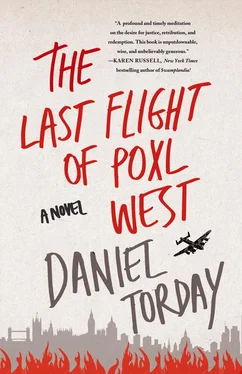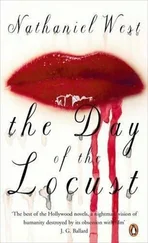We were free of the ice. In the brief moment we seemed free I began to feel spider legs of trepidation slide over my hands. Then another flash stole my sight, then a third. When I regained sight we were bathed in blue flame so thin I could see where on my hand minute blue effluvia sank canines into skin. I could feel it all around my molars, blue maws of flame stabbing their fangs into enamel. I tried to put my hand to my lap for my glove but my muscles all tensed. They wouldn’t untense. My jaw clenched tight and a jolt stole through me and atop my head I felt a burst of hot pain.
A great blue flash.
Eyes failed.
Then: nothing.
10.
The world returned in electric blue flames. No sooner had I regained consciousness than my brain made me believe I heard the voice of my cousin Niny saying in her native Czech, “Oh, I think he might be waking,” and “Keep your eyes closed, Poxl.”
I didn’t understand what Niny was doing in the cockpit of a Lancaster over Lübeck. Some large part of me felt as if from the time I’d first entered that cockpit I had been living some other, borrowed, life. One I knew well enough, but one that wasn’t mine. Soon enough my hand came to my face to feel the soft cloth covering my eyes.
Niny said again, “It’s all right, Poxl. You’ve survived and they’ve just got you here in Grimsby at the hospital and you’re all right.”
A doctor admonished her to speak to me in English so he and his nurses could understand her, and for her to tell me by some miracle I’d survived a lightning strike on S-Sugar. My only thought then was to tell her how I’d wanted her to meet John Gallsworthy, the best chap I’d yet come to know in my squadron.
But I wasn’t able to say anything at all.
Following the moment I was struck by lightning, Rowlandson had Gallsworthy drop his bombload, turned S-Sugar around and brought her back to base. Somehow amid the orange spiraling bullets of Me110’s they encountered on their return, the men of the Lancaster S-Sugar survived yet another run, only to lose the commission of their pilot to an electrical storm.
There were losses and there were losses, and my loss was of a particular variety: the loss of my commission to many months’ more rehabilitation in hospital. I’d suffered a rupture of my tympanic membrane as blue fires surged through my body. I could just make out the words Niny spoke at my bedside. My doctors came through and observed spreading ferns of Lichtenberg figures across my left arm. These red patterns across my skin were evidence of the lightning that had entered my body, bursting veins and capillaries along its path.
Only when I’d just regained my sight was I able to witness the ferns’ remnants. The eruption at the top of my head, where the electricity had singed my scalp, burrowed its path and exited back into the cloud over Lübeck, had mostly healed by the time I’d regained my hearing and had been weaned off the morphine that got me through those initial weeks, almost exactly as it had after my bout of pleurisy. I was left with a small patch of scalp atop my head where no hair would ever grow again.
But I was alive.
It would be a month before I was able to see. In those words of Goethe’s, “ Alles Nähe werde fern ”: “Everything near becomes distant.” Even when my hearing returned, the physical world stayed far from me until I could again see. I lay in bed for days, relegated to a chamber in a cave. The world around me grew to the likeness of those caverns where Mrs. Wilma Goldring, who felt me a suitable partner for her daughter Glynnis, who sparked in me a lifelong love of Shakespeare, had lived out the Blitz so as not to succumb to the bombs that took her daughter. Only in my cave, there were no other humans to join in my isolation. Around the shadows and in the corners of those visions I had in the weeks I lay alone convalescing I would see faces: at times Glynnis’s or Suse’s or my cousins’ or my mother’s, but as time progressed, only one face came to me: Françoise’s.
Now an idée fixe that had long been developing gained purchase: How did I know Françoise might not still be alive? So many others had died and I knew it. What if Françoise hadn’t been killed in the bombing of Rotterdam? This thought gained its toehold, and then more images: a carmine hollyhock blossom on the sill of a window to the east of London; purple tamarisks by the side of the Elbe in Leitmeritz; a bloom of purple tulip on the sill of a window in Delfshaven. I began to imagine Françoise alive and with a kind of electric shock I truly began to wonder what she would be thinking of me, what thoughts would pass her mind should the name Poxl appear there. The man, the boy really, who had come and fallen in love with her and then left without a word. Without a word. I let my mind drift back to the purple tulip, much easier. All these images again intertwined and I returned to fever dreams like when I was a child, an odd negative and positive switch: black and white, white then black, growing ever more menacing.
As I grew more and more calm, as the world began to return to my eyes and sound to my ears, things practical returned to mind. I saw the Leathersellers College, where I longed to return to work. I saw cousin Johana’s little ceramic spitz — I longed to see that little dog, and the flat I’d now absented for so long.
11.
Niny visited on the weekends when she was granted a pass to come see me in hospital. On one of her visits, just as I was beginning to regain the use of my eyes, I asked after my good friend Clive Pillsbury, whom I’d not seen in the brief period during which I was able to fly just five runs in a Lancaster bomber — I would never now come close to approaching the thirty-two necessary to complete my tour — and whom I was surprised to find had not yet come to visit.
“I’d hoped to put it off,” Niny said. “I don’t know how to say it, save for just saying it. Clive’s Spitfire went down over North Africa. He’s missing.”
It was almost a verbatim recurrence of that moment when I learned of Glynnis’s fate. Even without the proper use of my eyes to take in what I’m sure was the harrowed look on my cousin’s face, I knew in what way Clive Pillsbury had gone “missing.” Niny was a WAAF working the radio north of London. In taking communications from pilots for a year now, she had developed into an accurate detector for those kites that went down with a chance of their crews surviving, and those whose crews would stay missing until the Messiah again visited the Mount of Olives.
I would soon learn of the fate my crewmates from S-Sugar, as well, which would come only a month after I was struck by lightning: John Gallsworthy went down along with all the crewmen on that Lancaster, S-Sugar, over Essen, on yet another of Bomber Harris’s raids of the Ruhr Valley.
Some might suggest there was capital P Providence in my having been taken out of my bomber on the last night of the Battle of Hamburg. But mine is not so benevolent a God. Mine is the Elohim of the Pentateuch, whose ways are the ways of punishment, not reprieve. God of Sodom’s destruction, not Lazarus’s resurrection. God of Job’s misery. No other cheek turned, no sin granted absolution. Were I to have stayed on my commission, I would most certainly have found myself missing along with those men. But my fate had long been discrete from the fates of my fellow travelers.
I learned long after the war that well more than half of the men who’d joined the RAF during the war died in service. It’s become a commonplace, the millions of Jews who died along with my parents back in Czechoslovakia. Those destinies were distinct from mine — the numbers of those lost trying simply to survive, the numbers of those lost in the reckless action of attempting to fight back from the air. Instead, I lay in hospital until I was able to leave under my own recognizance. With my mind increasingly focused on a return to Rotterdam, I boarded a train south to London along with those few belongings shipped to me from my bunk up north of Grimsby.
Читать дальше












